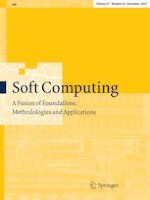30.10.2023 | Mathematical methods in data science
Evolutionary ensembles based on prioritized aggregation operator
Erschienen in: Soft Computing | Ausgabe 24/2023
EinloggenAktivieren Sie unsere intelligente Suche, um passende Fachinhalte oder Patente zu finden.
Wählen Sie Textabschnitte aus um mit Künstlicher Intelligenz passenden Patente zu finden. powered by
Markieren Sie Textabschnitte, um KI-gestützt weitere passende Inhalte zu finden. powered by
